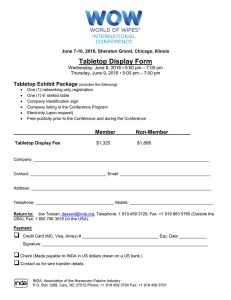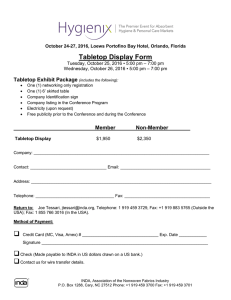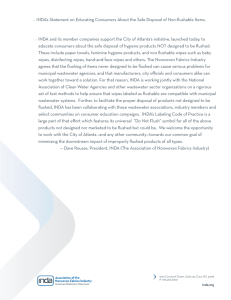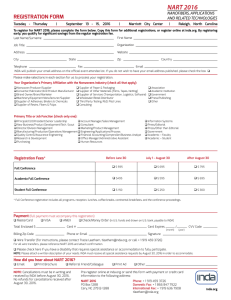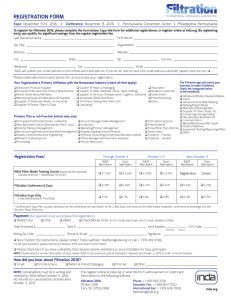INDA’s Antitrust Policy
advertisement
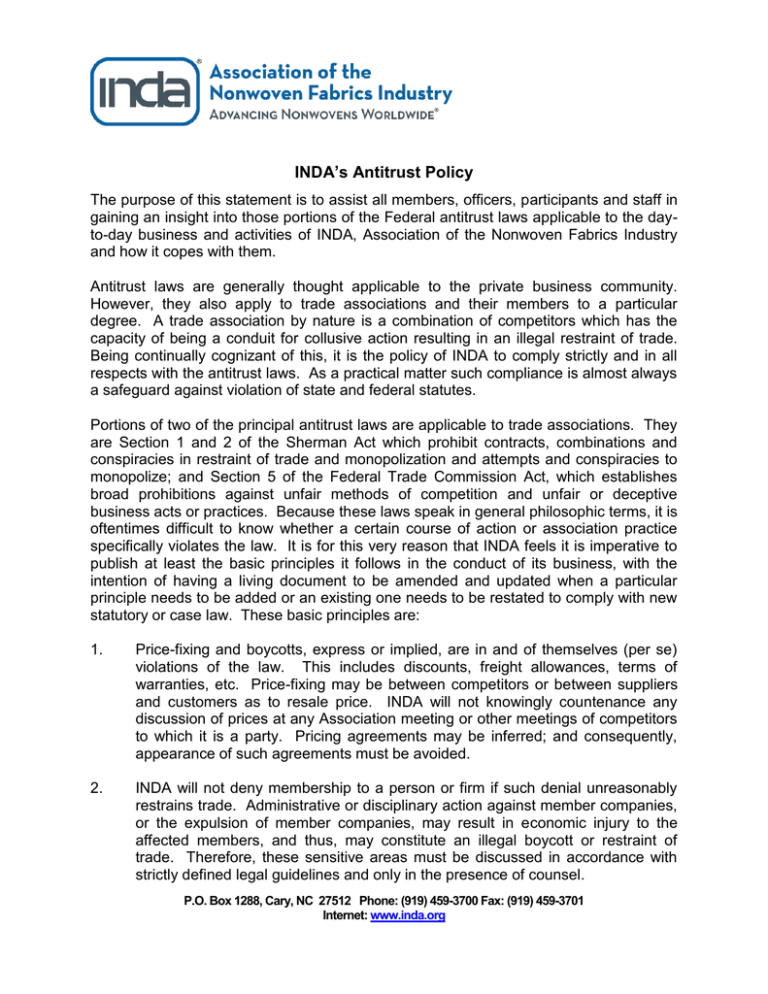
INDA’s Antitrust Policy The purpose of this statement is to assist all members, officers, participants and staff in gaining an insight into those portions of the Federal antitrust laws applicable to the dayto-day business and activities of INDA, Association of the Nonwoven Fabrics Industry and how it copes with them. Antitrust laws are generally thought applicable to the private business community. However, they also apply to trade associations and their members to a particular degree. A trade association by nature is a combination of competitors which has the capacity of being a conduit for collusive action resulting in an illegal restraint of trade. Being continually cognizant of this, it is the policy of INDA to comply strictly and in all respects with the antitrust laws. As a practical matter such compliance is almost always a safeguard against violation of state and federal statutes. Portions of two of the principal antitrust laws are applicable to trade associations. They are Section 1 and 2 of the Sherman Act which prohibit contracts, combinations and conspiracies in restraint of trade and monopolization and attempts and conspiracies to monopolize; and Section 5 of the Federal Trade Commission Act, which establishes broad prohibitions against unfair methods of competition and unfair or deceptive business acts or practices. Because these laws speak in general philosophic terms, it is oftentimes difficult to know whether a certain course of action or association practice specifically violates the law. It is for this very reason that INDA feels it is imperative to publish at least the basic principles it follows in the conduct of its business, with the intention of having a living document to be amended and updated when a particular principle needs to be added or an existing one needs to be restated to comply with new statutory or case law. These basic principles are: 1. Price-fixing and boycotts, express or implied, are in and of themselves (per se) violations of the law. This includes discounts, freight allowances, terms of warranties, etc. Price-fixing may be between competitors or between suppliers and customers as to resale price. INDA will not knowingly countenance any discussion of prices at any Association meeting or other meetings of competitors to which it is a party. Pricing agreements may be inferred; and consequently, appearance of such agreements must be avoided. 2. INDA will not deny membership to a person or firm if such denial unreasonably restrains trade. Administrative or disciplinary action against member companies, or the expulsion of member companies, may result in economic injury to the affected members, and thus, may constitute an illegal boycott or restraint of trade. Therefore, these sensitive areas must be discussed in accordance with strictly defined legal guidelines and only in the presence of counsel. P.O. Box 1288, Cary, NC 27512 Phone: (919) 459-3700 Fax: (919) 459-3701 Internet: www.inda.org 3. INDA will not discriminate unreasonably among exhibitors at its trade shows in the allocation of space, nor limit participation in them on the condition that there be no participation in other, similar trade shows. 4. Antitrust problems arise when the effect of standardization is to deprive customers of legitimate choices, to discriminate against competitors, or to fix prices or boycott suppliers. Consequently, all standards or guidelines participated in or developed by INDA will offer wide participation in their development by affected parties. In all cases, there shall be no agreement to adhere to any standard or guideline, and each member shall be free to follow or reject it as he sees fit. 5. Whenever INDA becomes involved in statistical reporting, it will clearly spell out its purposes and uses as designed to provide information to assist members in business decisions and not to restrict competition. Participation will always be voluntary and deal with past transactions and be reported in composite form. 6. Whenever collective research is undertaken by INDA, care will be exercised so as not to unreasonably restrain competition. Attention also will be taken to see that significant anticompetitive effects are not realized. 7. INDA will not sponsor or knowingly be a party of agreements express or implied, which restrict the members’ freedom in any way to make independent decisions in matters that affect competition. 8. Another area of potential antitrust infraction involves association-sponsored efforts to petition government agencies for action, which may have an adverse economic impact on some competing companies or industries. A delicate balance always must be maintained between the First Amendment right to petition government and the antitrust laws’ prohibition against restraint of trade. The First Amendment does not protect parties, which seek to persuade government agencies to impose trade restrictions by misleading them or by engaging in other dishonest activities. Any effort designed to injure industry competitors clearly is prohibited. 9. To help assure continuing compliance with the antitrust laws it is necessary to maintain proper legal supervision of Association activities. To this end it is INDA’s policy, reflected in the Association’s Bylaws to require the presence of legal counsel at all meetings of the Board of Directors and Executive Committee. 10. In order to help ensure continuing compliance with the antitrust laws the Association’s staff must play an active role in properly supervising Association meetings and other activities. To assist the staff in carrying out its responsibilities in this regard, legal counsel will periodically review, with the Association’s staff, the relevant antitrust statutes, case law and regulatory development of concern. Antitrust laws are wide-ranging, complex and subject to changing interpretations. Consult your company attorney or an Association Counsel immediately if you have any questions about the legality of any proposed Association action. INDA’s ANTITRUST CHECKLIST This checklist of antitrust “DOs” and “DON’Ts” is for use by INDA staff and member representatives in the conduct of INDA sponsored meetings and social gatherings. Participants in INDA-sponsored meetings and events should understand the purpose and authority of the groups or committees in which they participate, and should comply with both this checklist and INDA’s Antitrust Policy. This is not intended as an exhaustive list, however, and members are encouraged to seek the guidance of INDA counsel or professional staff members whenever questions arise. DO adhere to the following practices: Have an INDA staff representative or counsel present at all INDA-sponsored meetings. Prepare and adhere to advance written meeting agendas. Ensure that the minutes of all meetings fully and accurately describe all the matters that transpire. Protest against any discussions or meeting activities that appear to violate this checklist. If the discussion continues, you should promptly excuse yourself from the group, insist that the minutes reflect your departure, and communicate your protest to the appropriate INDA staff member and your company counsel. Consult with INDA’s legal counsel on all antitrust questions related to INDA’s activities, and educate yourself on the antitrust requirements related to your participation in INDA. DON’T, in fact or appearance, discuss or exchange information regarding any of the following matters: Individual company or industry prices, price changes, price differentials, mark-ups, discounts, warranties, allowances, credit terms, transportation or shipping costs, or any other terms or conditions related to sales. Individual company or industry figures on costs, production, capacity, inventories, sales, etc., except in connection with an approved, INDA-sponsored confidential statistics program. Plans of individual companies concerning the design, production, distribution or marketing of particular products, including proposed territories or customers. Elimination, restriction, or limitation of the quantity or quality of any product to be sold or division or limitation of sales to particular territories, customers, or classes of customers. Bids on contracts for particular products or procedures for responding to bid invitations. Matters relating to actual or potential individual suppliers or customers that might have the effect of excluding them from any market or of influencing the business conduct of firms toward such suppliers or customers.
